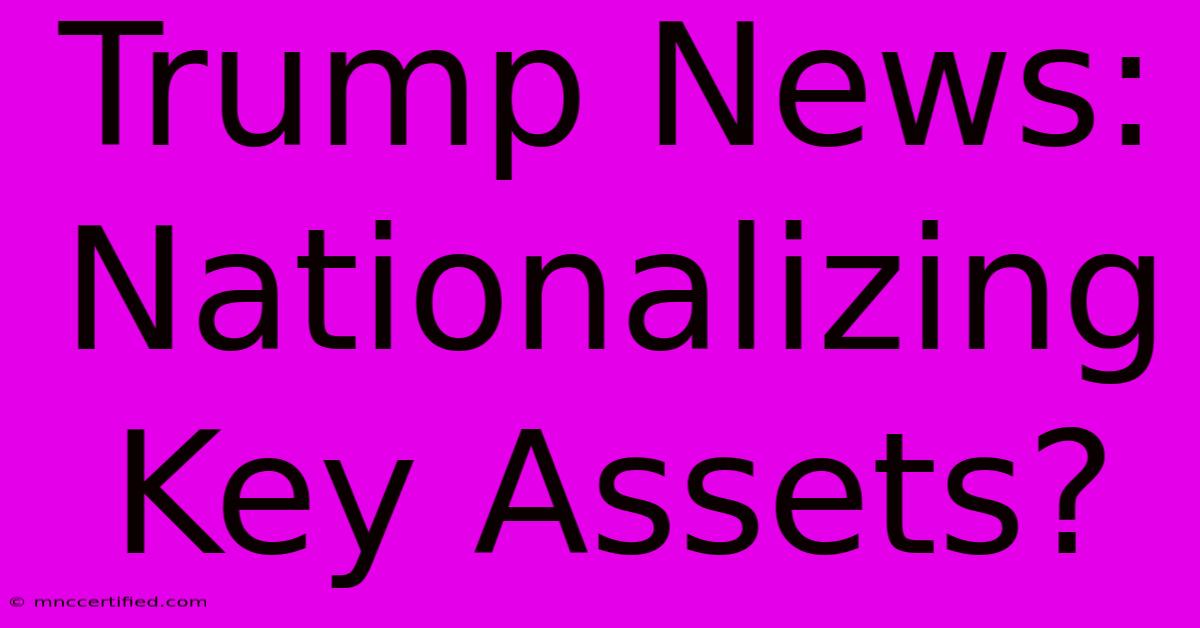Trump News: Nationalizing Key Assets?

Table of Contents
Trump News: Nationalizing Key Assets? Exploring the Implications of a Controversial Policy Proposal
Donald Trump's political career has been punctuated by bold and often controversial policy proposals. Among the most discussed is his suggestion, albeit sometimes implicitly, of nationalizing key American assets. This article delves into the potential implications of such a move, examining its economic, political, and social ramifications. We will explore the arguments for and against nationalization, considering both historical precedents and contemporary economic realities.
Understanding Nationalization: What Does it Mean?
Nationalization refers to the process by which a government assumes ownership and control of a privately-owned asset, industry, or company. This can range from small-scale interventions to complete takeovers of entire sectors. Examples throughout history include the nationalization of the British railways and various industries in post-revolutionary Cuba. However, it's crucial to distinguish between nationalization and government regulation. Regulation involves setting rules and guidelines for private businesses, while nationalization implies direct government ownership and management. Trump's rhetoric surrounding nationalization has often been less about explicit plans and more about expressing dissatisfaction with existing private sector management of crucial infrastructure.
The Trump Perspective: Hints and Interpretations
While Trump hasn't explicitly called for a sweeping nationalization program like some socialist or communist regimes, his comments on specific industries have fueled speculation. For example, his pronouncements on renegotiating trade deals and prioritizing American interests could be interpreted as a prelude to greater government control over strategic sectors. His criticisms of specific companies and industries, combined with his emphasis on "America First," leave room for interpretation regarding his long-term economic vision. Understanding the nuances of his language is critical to analyzing the potential for nationalization under a Trump administration.
Potential Targets for Nationalization: Strategic Industries and Infrastructure
If Trump were to pursue a nationalization strategy, which sectors might be targeted? Several key industries could be considered:
- Energy: Control over oil, gas, and renewable energy sources could be seen as vital for national security and economic independence.
- Healthcare: The high cost of healthcare in the US has been a recurring political theme, and nationalization of certain aspects of the healthcare system – perhaps focusing on pharmaceuticals or insurance – could be a way to address affordability and access.
- Telecommunications: Control over telecommunications infrastructure, including internet access, is increasingly viewed as crucial for economic competitiveness and national security.
- Transportation: Infrastructure such as airports, railways, and roads could become a focus, particularly if considered underperforming or vital for national logistical capabilities.
It is important to note that these are hypothetical scenarios. The likelihood of any specific industry being nationalized depends on various political and economic factors.
Arguments For and Against Nationalization
The debate surrounding nationalization is complex, with compelling arguments on both sides:
Arguments in favor:
- Increased efficiency: Proponents argue that government ownership could eliminate inefficiencies caused by profit-maximization and prioritize public good.
- Improved public access: Nationalization can theoretically ensure essential services, such as healthcare or internet access, are available to all citizens regardless of their socioeconomic status.
- Strategic advantage: Controlling key industries could provide a significant strategic advantage in international competition.
Arguments against:
- Reduced efficiency: Critics argue that government-run entities often lack the innovation and efficiency of private companies.
- Increased bureaucracy: Nationalization can lead to increased bureaucracy and red tape, slowing down decision-making processes.
- Economic distortions: Government intervention in the market can distort price signals and lead to resource misallocation.
- Political manipulation: Nationalized industries could be susceptible to political manipulation and favoritism.
Conclusion: Uncertainty and the Need for Informed Debate
The possibility of significant nationalization under a Trump-led administration remains a subject of debate and speculation. While explicit proposals for widespread nationalization are lacking, his pronouncements and actions warrant careful consideration. A robust and informed public discussion is crucial to understanding the potential economic, political, and social consequences of such a policy shift. Further research is needed to analyze the potential benefits and drawbacks of nationalizing specific industries within the context of the American economy and political system. This includes investigating historical precedents, assessing the specific characteristics of different industries, and carefully evaluating the likely consequences for different stakeholder groups. Only through such rigorous analysis can we arrive at a well-informed understanding of this complex and potentially transformative policy issue.

Thank you for visiting our website wich cover about Trump News: Nationalizing Key Assets?. We hope the information provided has been useful to you. Feel free to contact us if you have any questions or need further assistance. See you next time and dont miss to bookmark.
Featured Posts
-
Nolans Oppenheimer Follow Up A New Adaptation
Dec 24, 2024
-
Sex Drug Charges Against Gaetz
Dec 24, 2024
-
Buehler Agrees To 21 M Red Sox Deal
Dec 24, 2024
-
Jones On Mc Carthy Cowboys Victory Praise
Dec 24, 2024
-
Morrisons Discount Offers System Issue
Dec 24, 2024